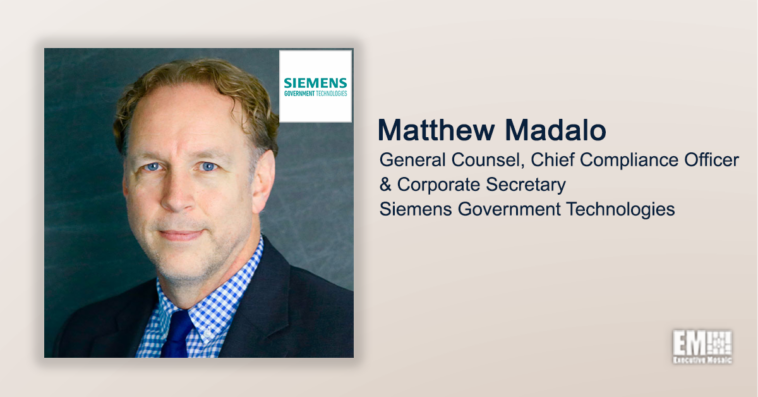Matthew Madalo, general counsel, chief compliance officer and corporate secretary of Siemens Government Technologies, recently spoke with ExecutiveBiz regarding the core values that define SGT’s company culture in such a competitive market as well as the impact that compliance standards such as CMMC or CMMI are having on federal policy changes during the latest Executive Spotlight interview.
“Compliance is an art form. It’s recognizing the risks and balance your customers require to achieve their objectives, as you mitigate accepted risk while embracing innovative solutions that fulfill your customer commitments and return profitable growth for your business.”
You can read the full Executive Spotlight interview with Matthew Madalo below:
ExecutiveBiz: What are the core values that are important to your company’s culture? How has your team developed its workflow and ability to drive success in such a competitive market?
“At Siemens Government Technologies our culture is a direct extension of the strategic goals we measure ourselves by each year through our performance objectives. Those goals are: Be an awesome place to work; perform with excellence; grow company value; be a good neighbor; and lead with integrity.
For my team and how we reflect those goals in our work, it’s about direct support to the business development and capture teams, as well as ensuring our legal, contracts, and compliance functions support the successful execution of our business across all programs and everything else we do.
One of the big initiatives we put into place this year was to revise our review process of proposals and contracts going out the door. That was very instrumental to ensure that everybody has a seat at the table and we’re providing proper support to the entire organization.
On the compliance side, the objective in our role is to ensure that the company operates in a compliant and ethical manner, but also understanding that we have a core mission of supporting the business and being able to do what we need to do to win and capture new business.
At the highest level, compliance is a very important and difficult job because the entire company relies on our attention to detail and understanding of the issues involved.
As a result, we spend a lot of time training with our employees, and we’re integrated with the business, talking with our leaders internally and also externally with our agency partners, who also monitor our compliance.
For me and my team it’s essential to understand every angle of our business, from the time an opportunity comes in through successful capture, execution and completion; so that we’re touching each individual stakeholder within the company during every step of that process. I’m incredibly proud of my team’s efforts across the board.”
ExecutiveBiz: With CMMC, CMMI, and other compliance standards changing to push the best business practices for federal contractors and companies, what can you tell us about the challenges of maintaining those standards and making changes to your own policies to remain compliant?
“I think the goal is getting the right people involved who understand the applicable regulations and rules feeding the development of the government regulations, standards and guidance.
That’s so important and it’s the skill sets you’re looking for and who you can trust with the critical issues to understand the possible impact to the business and the parameters in which we have to operate.
At SGT, we’re a separate but affiliated unit of a commercial company doing government work. The translation from the commercial aspects to the government side is critical.
As the government seeks to leverage commercial best practices and applicable technologies, we always seek out constructive ways and forums to share feedback as various agencies formulate policies in rapidly evolving areas like cybersecurity.
That’s why they (government) have a question and answer period once they present a proposed rule. We look at it from the perspective of trying to help shape the rulemaking process and try to help the government understand how these changes will impact industry.
For something like CMMC, it has been an iterative and evolving process, and the government is working to incorporate many of the significant questions raised by industry.
This is a good thing, and we share in the government’s concern for doing everything in our power to protect our digital infrastructure and computing networks to ensure we maintain the overall health, security, and economic prosperity of the nation. It truly is a shared responsibility for government and industry.”
ExecutiveBiz: What are your strategic goals for the coming year? What do you hope to accomplish and any new markets that you’re keeping an eye on in the federal sector?
“For me, it’s all about building robust compliance systems and strengthening what we already have and ensuring we have very robust compliance tools that our people are well trained to utilize.
We’re focused on broadening our existing customer base and growing our business while also creating efficiencies where our compliance is part of the support structure that’s helping the business achieve its goals.
For instance, one of the fastest growing areas of our business is in digital transformation for our customers, incorporating the use of digital twins that allow you to build, test and optimize systems virtually before ever bending a single piece of metal in the real world.
As we increasingly rely on software and evolve our digital portfolio, we are working closely with our customers to understand their guidelines and requirements for data rights and protection. Just as we digitally transform, our compliance approach will have to do the same, to retain our proprietary rights as a business while addressing emerging government missions. It’s an exciting time for sure; and perhaps giving me a few gray hairs too!
In many ways, compliance is an art form. It’s recognizing the risks and balance your customers require to achieve their objectives, as you mitigate accepted risk while embracing innovative solutions that fulfill your customer commitments and return profitable growth for your business.”





